Local Speed and Agility Coaches to Boost Your Game
Why Finding the Right Speed and Agility Coach Can Transform Your Performance
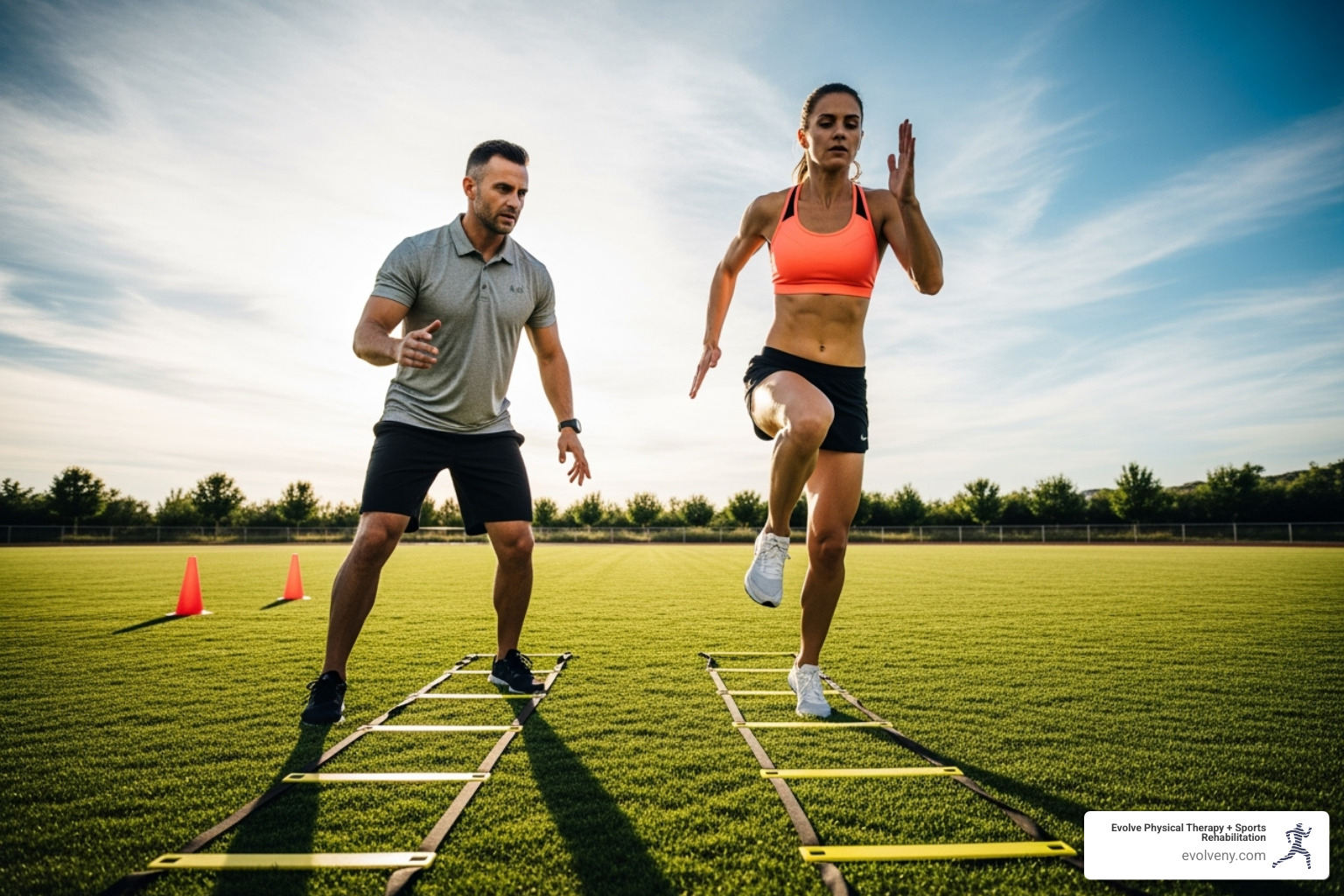
Whether you're an athlete or simply want to move better, a speed and agility coach near me can provide the specialized training to open up your potential. The right coach helps you move more efficiently, reduce injury risk, and build confidence.
Quick Answer: What to Look for in a Speed and Agility Coach:
- Certified professionals with credentials like NSCA or USATF certification
- Proven experience working with athletes in your sport or fitness level
- Personalized approach that addresses your specific goals and limitations
- Reasonable pricing typically ranging from $75-$120 per hour for private sessions
- Strong testimonials and a track record of client success
- Safe training environment with proper equipment and injury prevention focus
Research shows that speed and agility training improves reaction time, coordination, and injury prevention. As one expert notes, "Speed is a skill set that can be improved through specific training techniques, not solely based on genetics." These benefits extend to non-athletes, improving balance and functional movement for daily life.
As Lou Ezrick, founder of Evolve Physical Therapy, I've seen how the right coach transforms performance and injury resilience. The best coaches combine technical expertise with a deep understanding of movement mechanics and injury prevention.
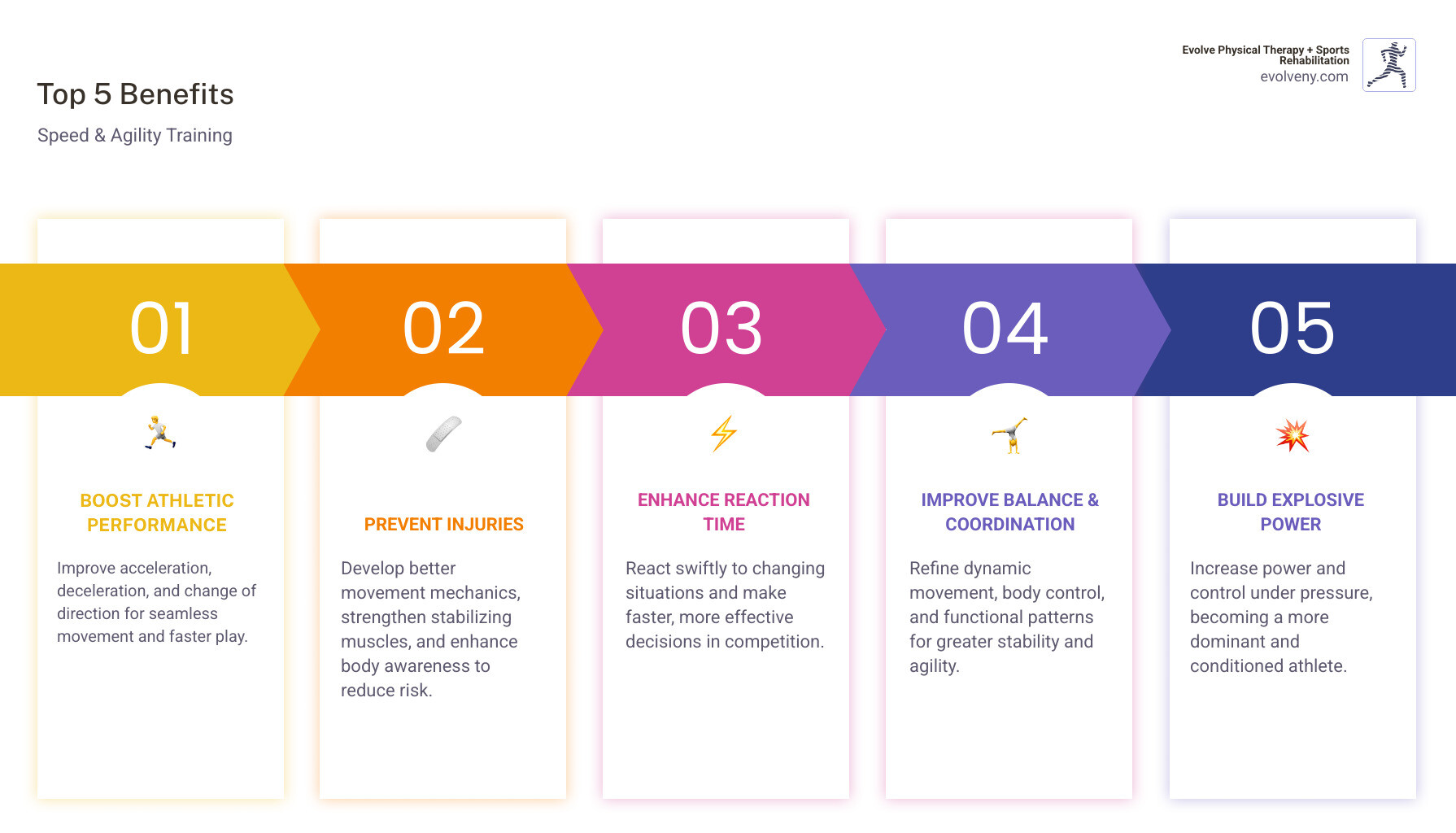
The Game-Changing Benefits of Speed and Agility Training
Speed and agility training is a holistic approach that sharpens your body's ability to move with power, react instantly, and stay in control. Whether you're an athlete or just navigating busy Brooklyn streets, this training makes you a more dynamic and resilient mover.
One of the biggest wins is improved athletic performance. Athletes see significant gains in acceleration, deceleration, and changing direction. It’s about moving smarter, not just faster, leading to more success and confidence.
Beyond performance, a crucial benefit is injury prevention. This training emphasizes proper movement mechanics, strengthens crucial stabilizing muscles, and boosts body awareness. A well-trained body is more resilient and less prone to injury.
This training also hones your improved reaction time. Targeted drills help athletes process visual cues faster and respond with immediate, precise movements—a critical cognitive skill in sports.
Finally, your balance and coordination get a major upgrade. These skills translate directly to daily life, improving stability and preventing falls. As physical therapists at Evolve Physical Therapy, we know that mastering posture, balance, and coordination is key to reaching your full potential.
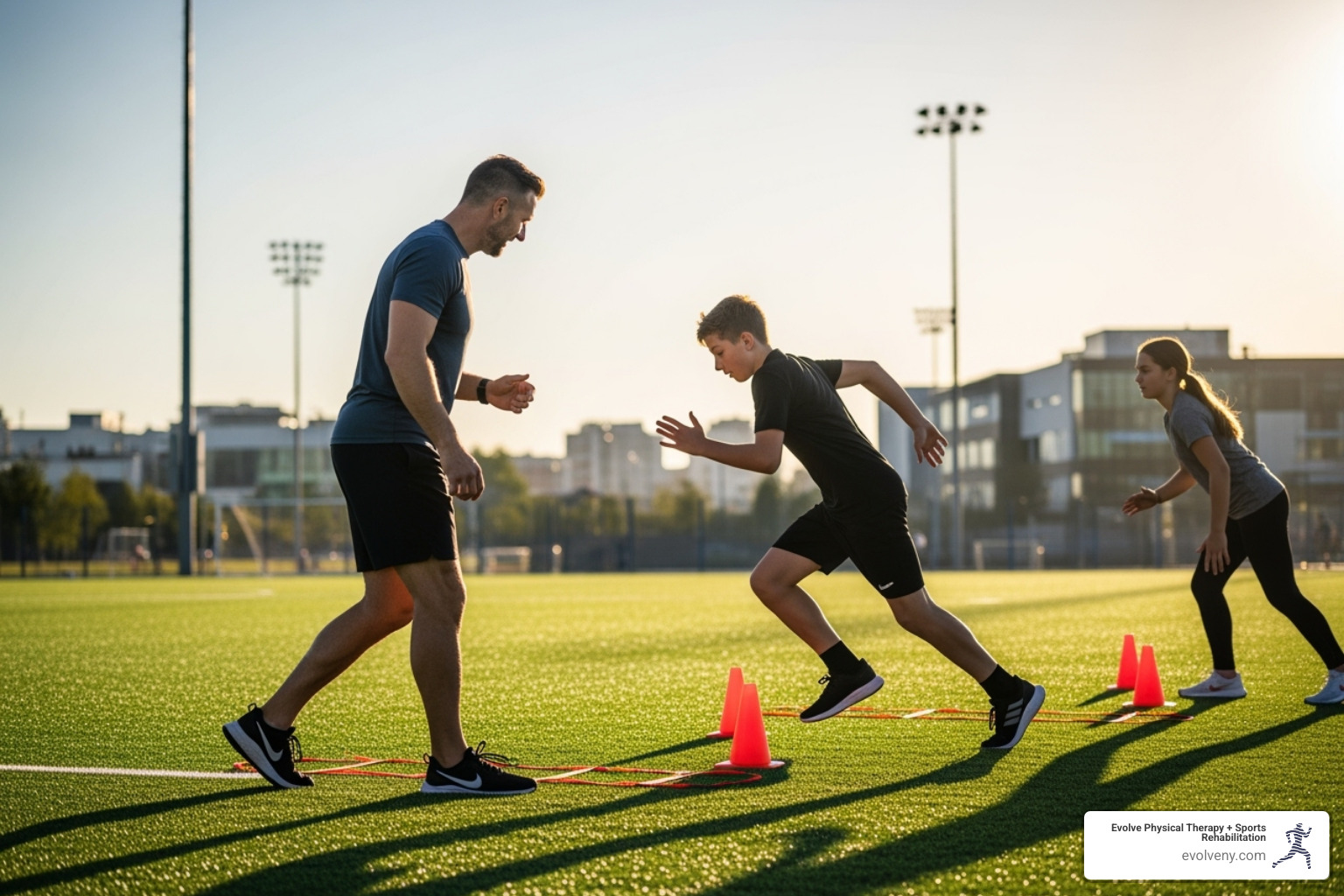
Skills You'll Sharpen: From Acceleration to Footwork
Speed and agility training breaks down movement and rebuilds it with precision. Key skills you'll sharpen include:
- Linear speed: Straight-ahead sprinting, focusing on mechanics and acceleration.
- Change of direction: The ability to decelerate, stabilize, and quickly switch directions.
- Acceleration: Your initial burst of speed, crucial in most sports.
- Deceleration: The ability to slow down under control, key for injury prevention.
- Footwork: Quick, precise foot placement for efficiency and balance.
- Explosive Power: Generating maximum force in a short time, often developed with plyometrics.
- Body control: Maintaining balance and posture during dynamic movements.
More Than Just Fitness: How This Training Prevents Injuries
As physical therapists, we at Evolve Physical Therapy + Sports Rehabilitation know speed and agility training is a powerful tool for injury prevention. It's about moving smarter to handle the demands of sports and daily life.
The core of this is developing proper movement mechanics—learning to run, cut, and land correctly to minimize stress on joints. The training also strengthens stabilizing muscles around the knees, ankles, and hips, creating a more robust support system. Finally, it improves body awareness (proprioception), allowing you to instinctively adjust and avoid awkward movements that could lead to injury. Our hands-on approach complements this training, bridging the gap between rehabilitation and peak performance. To learn more, explore our physical therapy for athletes.
Tracking Your Gains: How to Measure Progress
Seeing your improvement is motivating! A speed and agility coach near me will use objective methods to track progress.
Performance testing is key, with benchmarks set at regular intervals. Common tests include:
- 40-yard dash: Measures linear speed.
- Pro-agility test (5-10-5): Measures change-of-direction ability.
- Vertical and broad jumps: Measure explosive power.
Beyond numbers, coach feedback provides qualitative insights on your technique. Many also use video analysis to break down movements frame by frame, helping you visualize corrections. This combination of quantitative and qualitative data clearly shows your progress and helps adjust your training plan.
What to Look for When Searching for a "Speed and Agility Coach Near Me"
Finding the right speed and agility coach near me in Brooklyn requires looking at their qualifications, coaching approach, experience, and reputation. You want someone who understands how to get the best out of you.
Look for coaches who are certified professionals. This means they have credentials from respected organizations like the National Strength and Conditioning Association (NSCA) or USA Track & Field (USATF). Beyond certifications, consider their coaching philosophy. Do they develop the whole athlete, focusing on mental toughness and safety? Experience with athletes at your skill level and positive testimonials are also crucial indicators of a great coach.
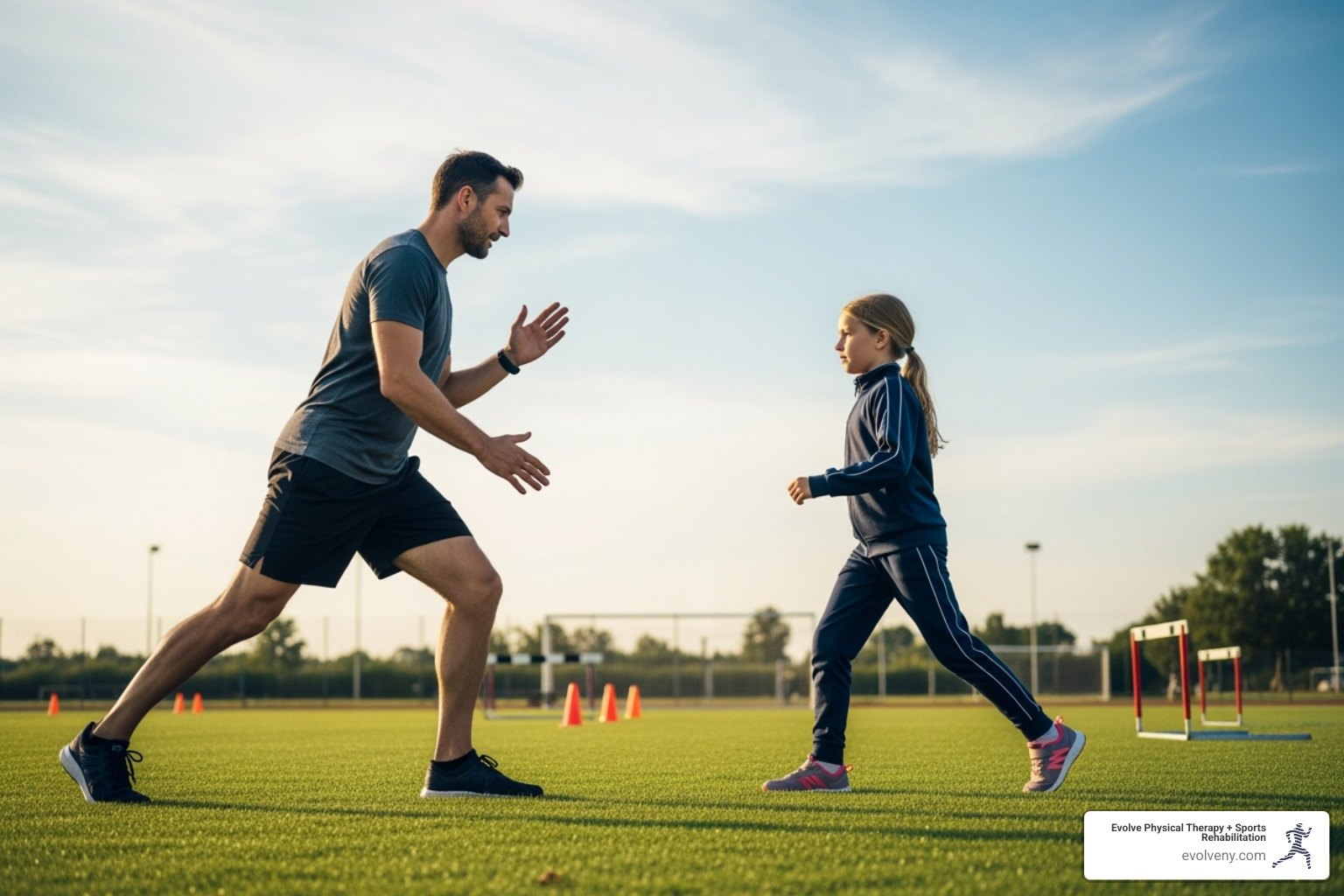
Evaluating a Local Coach: Credentials, Philosophy, and Fit
When evaluating coaches, start with credentials. Look for certifications like NSCA's Certified Strength and Conditioning Specialist (CSCS) or those from USATF, which show a professional standard. Also, ask about background checks for safety.
Next, assess their philosophy to ensure a good fit. A great coach offers personalized instruction, not a one-size-fits-all program. Ask how they motivate athletes and if they explain the why behind drills. A positive, holistic approach that builds character alongside athletic skill is ideal.
Finally, prioritize trust and safety. A good coach emphasizes proper movement over intensity and creates a safe training environment. Look for someone who shows accountability and genuinely cares about boosting your confidence through personalized guidance.
Program Options and Costs When You Find a speed and agility coach near me
You'll find various options to fit different needs and budgets.
- Private Coaching: The most personalized option, with programs custom to your goals. Rates typically range from $75 to $120 per hour.
- Group Sessions: A more affordable option that creates a fun, competitive atmosphere. Drop-in classes might be around $30, with multi-week programs costing more.
- Team Training: A cost-effective way to train an entire team, with the price per player decreasing with more participants.
Many coaches offer package deals that lower the per-session rate. Some also provide flexible memberships. Always ask about expiration policies on purchased sessions.
The Role of a speed and agility coach near me in Your Development
A speed and agility coach near me is a mentor and strategic partner. They help with goal setting, creating clear targets for your athletic journey. They provide customized plans, designing training around your unique needs to maximize results. A great coach knows how to push limits safely, challenging you while ensuring correct form to prevent injuries. Most importantly, they are crucial for building confidence and providing accountability, celebrating your wins and keeping you committed. This helps you develop a winner's mindset and grow as both an athlete and a person.
Common Training Methods and Drills Explained
When you team up with a speed and agility coach near me, you'll encounter a toolkit of smart training methods designed to boost your speed, quickness, and power. The goal is always to help you move more efficiently and with better control.
Sessions typically begin with a dynamic warm-up to prepare your body for action. You'll then dive into plyometrics—explosive exercises like box jumps and broad jumps that build power. Agility ladders and cone drills are used to sharpen footwork, coordination, and your ability to change direction. Resistance training builds functional strength, while advanced methods like overspeed training can reprogram your nervous system to move even faster. A good coach will always incorporate sport-specific movement patterns to ensure your training translates directly to your game.
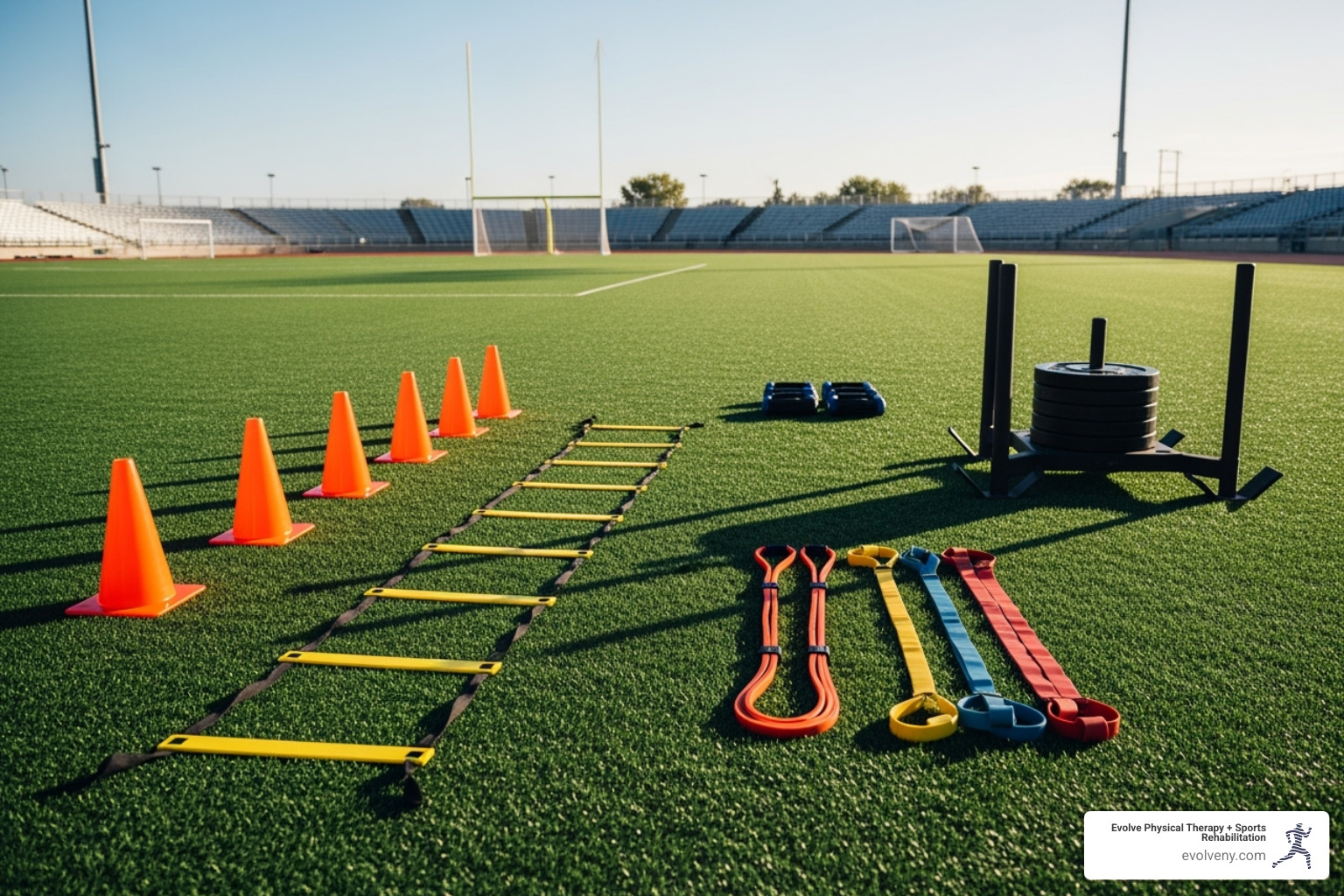
Building Blocks: Foundational Drills for Speed and Agility
Mastering the basics is essential. A top speed and agility coach near me will ensure you perfect these foundational drills:
- A-Skips and B-Skips: Teach proper running form, rhythm, and coordination.
- High Knees: Build leg drive and strengthen hip flexors for powerful strides.
- Ladder Drills: Drills like the Ickey Shuffle improve footwork, coordination, and quickness.
- Box Jumps: A plyometric exercise to build vertical power and teach safe landing mechanics.
- Dot Drills: Improve foot speed, agility, and balance by moving between dots in set patterns.
These drills build the fundamental mechanics needed for advanced speed and agility work.
Advanced Techniques for a Competitive Edge
Once you've mastered the basics, your coach can introduce advanced techniques for a competitive edge.
- Resisted Sprints: Running against resistance, like pulling a weighted sled or parachute, builds strength and acceleration.
- Assisted Sprints (Overspeed): Running faster than your natural top speed (e.g., downhill) trains your nervous system to fire more rapidly.
- Reaction Ball Drills: Using an unpredictable bouncing ball improves reflexes and hand-eye coordination.
- Sport-Specific Movement Patterns: Drills are customized to mimic the exact movements of your sport, ensuring training directly translates to in-game performance.
These advanced methods, combined with smart recovery techniques available at places like Evolve Physical Therapy, create a holistic approach to your athletic development.
Frequently Asked Questions about Speed and Agility Training
It's natural to have questions when exploring how to optimize your body's performance. Here are some of the most common inquiries we address at Evolve Physical Therapy + Sports Rehabilitation:
How often should I do speed and agility training?
The ideal frequency depends on your fitness level, sport, and whether you're in-season or off-season. Generally, 1-3 times per week is a good target. During the off-season, you might train more (2-3 sessions) to build your foundation. During the in-season, the focus shifts to maintenance, so 1-2 shorter sessions per week is often enough to stay sharp without causing burnout. Quality over quantity is the golden rule. It's better to have two focused sessions than five fatigued ones. Rest and recovery are also critical, as your muscles and nervous system need time to adapt and grow stronger.
At what age can an athlete start speed and agility training?
Age-appropriate training can start much earlier than most people think, laying a foundation for lifelong movement skills.
- Ages 4-8: The focus is on fun and fundamental motor skills through play—running, jumping, and balancing.
- Ages 7-12: More structured training can be introduced, focusing on proper running mechanics and basic agility drills with an emphasis on technique over intensity.
- Ages 12 and up: Athletes are typically ready for more specialized and intense training. A skilled speed and agility coach near me will always tailor the program to the athlete's developmental stage, prioritizing safety and proper mechanics.
Can speed and agility training help non-athletes?
Absolutely! The benefits extend far beyond sports. For non-athletes, this training improves overall fitness, coordination, and balance, which are crucial for daily life. Think of reacting quickly to avoid a trip on a sidewalk or moving efficiently while carrying groceries. It's also a powerful tool for injury prevention in daily life, as it builds robust movement patterns that protect your joints from unexpected stresses. The core principles—improved reaction time, balance, and body control—improve your functional movement and overall quality of life, helping you move with greater freedom and confidence.
Conclusion: Take the Next Step in Your Athletic Journey
We've seen how speed and agility training is a powerful investment in yourself. It's not just about running faster; it's about moving smarter, reacting quicker, and building a more resilient body. Finding the right speed and agility coach near me is key—they are a mentor and motivator who will help you build confidence and safely push your limits.
Here at Evolve Physical Therapy + Sports Rehabilitation in Brooklyn, we understand the connection between moving well, performing your best, and staying healthy. Our hands-on physical therapy services are designed to complement your training. We help you heal from setbacks and strengthen your body to prevent future issues, ensuring you can sustain peak performance.
If you're ready to open up your full potential, take the next step with a qualified coach. And remember, we're here to support your athletic journey. To learn how our specialized sports rehabilitation can help you get the most out of your training, visit us here: Take your performance to the next level with sports rehabilitation.

